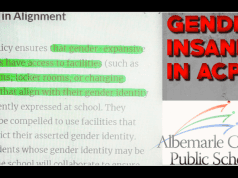The Charlottesville–Albemarle 1998 Sustainability Accords are a radical document. Composed and promoted by radical elements of the local enviro-socialist movement and closely aligned with the ICLEI / United Nations / Agenda 21 Sustainability goals, the Accords are a direct threat to individual liberty. The United States Department of Housing and Urban Development (HUD) has committed—and the localities have accepted— one million taxpayer dollars to fund implementation of these Marxist-derived Sustainability principles. Yet, the controversial aspects of the Accords have gone completely unreported by local mainstream media.
While Charlottesville Democrats attempt to muster city support of the Accords’ implementation in Albemarle County, another subversive group has surfaced to further the Marxist, population control, and anti-property-rights agenda.
The Albemarle Responsible Citizens’ Alliance (ARCA)—headed by Progressive ringleaders Sally Thomas and Waldo Jaquith—defends the Accords as benign , merely reflecting the will of everyday people to ensure future communal “health”:
The Sustainability Accords being decried by the Tea Party were developed by a group of local citizens from the six localities of the district—a “diverse group of farmers, business people, foresters, environmentalists, developers and elected officials” who were charged with creating a vision for “a future where our economic, human, social, and environmental health are assured.” Over a period of four years, the group developed a mission statement, with goals, objectives, indicators and benchmarks, through a public process with forums and working groups. The Accords were presented to the public on June 16, 1998, were signed by citizens and local elected officials, and included as part of the comprehensive plans both Albemarle and Charlottesville.
Both Thomas and Jaquith are directly or philosophically aligned with the fanatical, zero-population-growth, Advocates for a Sustainable Albemarle Population (ASAP), and ARCA appears to be nothing more than a palatable, public front-end for ASAP’s extreme no-growth advocacy efforts.
ARCA and the Charlottesville Democrats also have friends working on the inside: Albemarle County Board of Supervisors members Ann Mallek (chair) and Dennis Rooker. Both repeatedly have expressed support for the 1998 Sustainability Accords, with Rooker publicly referring to conservative Accord skeptics as government “infiltrators.”
When confronted, Sustainability Accords advocates often refer to relatively complaisant aspects of the document: transportation alternatives, water quality, wildlife protection, etc.
But when parsed even mildly, the 1998 Sustainability Accords are far more sinister.
The primary Sustainability issue addressed in the document is “management” of “Human Population.” The Accords suggest government intervention in:
- Population growth
- Population distribution by racial, ethnic, age, education, income, and employment status
- Population “dynamics,” including human fertility
“Human Basic Needs” also are slated for proposed intercession. The Accords seek government guarantees for community members’:
- Adequate daily nutrition
- Adequate clothing
- Adequate housing
- Optimal health
- Realization of “full potential” through education
- Adequate and affordable transportation access
- Employment that offers just compensation, fulfillment, and opportunities for advancement
The Accords seek government involvement in community “Values and Ethics” by:
- Ensuring “equitable sharing” of societal “benefits and costs”
- Creating conditions that promote a “healthy balance” of “wealth, power, and privilege”
- Insinuating government-approved conflict resolution tools into private disputes
- Encouraging public and private “institutions” to evaluate “ethical responsibilities”
- Manipulating local media and schools into promotion of the Sustainability agenda
The Accords authorize government to promote its own growth and power via:
- Advocacy of community organizing
- Encouragement of individuals’ “full involvement” in government
- Re-education in areas of “self-sacrifice” and “self-restraint”
- Increased availability of “government services”
- Implementation and continuation of “progressive” and “equitable” taxation schemes (N.B. Progressive taxation is a plank of the Communist Manifesto)
The 1998 Sustainability Accords also seek to:
- Monitor and evaluate personal “savings” levels (i.e. individuals’ money in the bank)
- Enhance citizens’ economic “understanding”
- Micro-manage types and sizes of locally operating businesses
- Obtain full government control over the size, “appropriate” scale, location, use, recreational aspects, and interconnectability of all new development
- Promote alternative transportation systems that are “non-polluting” (i.e. bicycle and pedestrian) at the expense of personal automobile travel
- Provide “free” public Internet access
- Mandate expensive “green” building techniques and construction materials
- Control the economic, environmental, social, and political “interdependence” (relationship) between local urban and rural areas
- Achieve “international marketing” of local forest and agricultural products
- Promote consumption of local products at the expense of free markets, through government subsidy and market manipulation
- Increase government control over private lands through promotion of publicly financed “conservation easements”
- Equate the value of plant and animal life with that of human life (N.B. The preservation of unborn humans is not considered an element of human sustainability in the 1998 Sustainability Accords.)
Thirteen years later, the Thomas Jefferson Planning District Commission (TJPDC)— lead applicant in the $1,000,000 HUD grant—on their web site has “sanitized” and summarized the 1998 Sustainability Accords as follows:
The 1998 Sustainability Accords are both a first step and a final product. The fifteen statements were distilled from a far larger set of objectives and concerns, using two criteria: the urgency or immediacy surrounding the objective and the degree to which it is related to the other objectives. Highest priority was assigned to those objectives for which reliable, factual information could be obtained. These data allow for the measurement of trends, either toward or away from sustainability.
- Encourage and maintain strong ties between the region’s urban and rural areas
- Strive for a size and distribute the human population in ways that preserve vital resources
- Retain the natural habitat
- Ensure water quality and quantity are sufficient to support people and ecosystems
- Optimize the use and re-use of developed land and promote clustering
- Promote appropriate scale for land uses
- Retain farm and forest land
- Develop attractive and economical transportation alternatives
- Conserve energy
- Provide educational and employment opportunities
- Increase individual participation in neighborhoods and communities
This beneficent description is a far cry from the insidious planks of the source. Interestingly, the TJPDC does not provide a link to the original Accords from this page, which is entitled, “The 1998 Sustainability Accords.”
Supervisor Rooker and others Accords defenders deceptively have pointed to this version of the Sustainability Accords as the foundation for future regional “planning,” ignoring the actual document upon which the HUD grant was premised.
Perhaps as frightening as the Accords, themselves, is the Charlottesville Region Sustainability Implementation Plan —designed to facilitate full implementation of the 1998 Sustainability Accords through the $1,000,000 HUD grant.
The Implementation Plan calls for:
- Unified code and ordinance changes for Albemarle County and Charlottesville to further the referenced Sustainability goals
- Incorporation of Sustainability strategies into local government comprehensive plans and the Metropolitan Planning Organization Long Range Transportation Plan
- Development of “systems for changing behavior on the part of individuals and institutions”
- Dispersion of poverty
- Focus on “socioeconomic inequity”
- “Shifting demand” from automobile travel to transit, bike, and pedestrian travel
- Unifying land use and transportation goals for Albemarle County and Charlottesville
- Economic development that provides jobs for “individuals with average levels of education”
- Formation of a Regional Transit Authority
- Reduction of “green house” gasses
- Official government acknowledgement of man-made climate change “science”
- Sustainable adaptation to man-made climate change (i.e. global warming)
- Taxpayer subsidized energy retrofits for housing and business
- Recommendations to reduce transportation and housing “access barriers” for children and seniors (intergenerational Sustainability)
- Development and implementation of Sustainable strategies for housing
- Taxpayer funded “affordable housing” subsidies
- Wide-spread changes in land use
- Reduced emphasis on traffic congestion mitigation and improving road safety
- Measurement of personal vehicle miles traveled (VMT)
- Government limitations on VMT and personal automobile use
- Avoidance of “undue” impacts on individual property rights
The ten-page Soviet-style implementation manifesto emphasizes government-induced “behavior change” for local citizens, businesses, and organizations—the words, “behavior” and “behavior change” referenced 21 times throughout. The behavior change process is given special emphasis in the Implementation Plan:
Task #5: Plan for Behavior Change Processes
Changing behavior in favor of sustainability on the part of both individuals and organizations is a critical component of actually implementing sustainability. Long term, permanent sustainability requires changes to the processes that shape the built environment. But the built environment changes very slowly. In the short term the most immediate gains in sustainability can be achieved by changing behaviors on the part of individuals and organizations. It is expected that as part of this project, a few key behaviors will be identified that, if changed, would greatly benefit the overall sustainability of the Charlottesville/Albemarle metropolitan area. This task is designed to prepare a plan for the process that would need to be put in place to bring about those changes in behavior.
In short, the 1998 Sustainability Accords (and the 2011 Implementation Plan) are pure poison.
Proponents can wrap them in a sustainable bow.
They can conceal them with sustainable lipstick.
They can characterize them as sustainable principles of “equity” and “justice.”
Still, they are poison.
The Thomas Jefferson Planning District Commission, in conjunction with its Albemarle County and City of Charlottesville partners, is conspiring to commit a massive fraud. The TJPDC’s proposed implementation of the 1998 Sustainability Accords is a direct assault on the liberties of its own citizens. The inherent threat to property rights—the foundation of Constitutional freedoms—is real and acknowledged. Citizens must not relinquish God-given, Constitutionally protected rights to elected and appointed big-Government authoritarians, no matter how nicely they ask or what they promise in return.









I have read the accord and your comments and agree that now is the time to speak out against the act. I will attend the Wednesday meeting to protest this action. Thanks for your views on this matter.
thank you rob, glad the marxist all live together, reminds me of a ghetto
Please! Despite whatever side you as an individual (for those still left capable to do so)come down on, ask yourself this:
What of this fails or passes the George Orwell Animal Farm Test?
I ask, because no one set of animals (figuratively speaking)should be or end up MORE EQUAL THAN THE OTHERS!
What of all our (the people’s) local government in our region fails or passes the Animal Farm Test?
Good work, Rob.
I think we need an expose on the ways our Albemarle County politicians have deprived us of our property rights over the past 60 years.
I bought a few acres of land in the county in the 1950s, planning either to build a home on it when settled in a job here, or to go off to work elsewhere and ultimately return to build a retirement home on the property. The property taxes when I purchased the property were $4.58/year.
I returned in the 1990s, built a home, and moved in, although the land taxes had now risen to ca. $1,200/year.
In my absence, the Board of Supervisors had become ruthless, however, and during the late 1990s and 2000s, they escalated the taxes on my land alone by 400%, to nearly $5,000/year.
In addition, the Supervisors apparently thought they could be dictators. During my 30 years absence, earning a living in other parts of the US, they had passed new laws saying that an Albemarle County landowner cannot now sell a portion of his/her land without jumping thru ten hoops established by The County. So they now tell me I can only sell ALL(many acres) of my land in one piece, or I can contract with a VA licensed professional engineer to subdivide it into tiny lots, then have it “approved” by The County, and then install roads and utilities. They are oblivious to the fact that this is expensive ($75,000 to 100,000) time consuming, and in my personal opinion, an infringement on my rights. Furthermore, I consider the subdivision of an acreage into tiny, rectangular lots by an engineer to be a poor way to develop land. Far better to sell individual portions as desired by each buyer for his or her own desired layout and development.
As a land owner, I was notified of none of these new laws during their drafting and passage; which I have been told is a legal requirement for politicians.
I was, in the 40 year interim, living in other states where I could get employment since the Albemarle area has remained deficient in R & D companies wherein I might have earned a living locally.
[…] its million-dollar maniacal pursuit to implement the 1998 Sustainability Accords in Albemarle County and Charlottesville, the Thomas […]